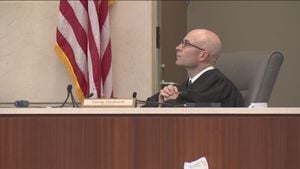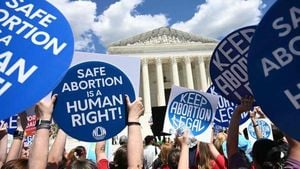Palm Springs, California is on the verge of making history with the approval of a nearly $6 million reparations deal aimed at compensat ing Black and Latino families who were displaced from their homes during the tumultuous 1960s. This monumental decision, expected to be voted on by City Council members, marks a significant step forward in addressing the historical injustices faced by these communities.
The roots of this agreement can be traced back to the city's actions when it demolished Section 14, a primarily minority neighborhood, to facilitate commercial development. According to the New York Times, the demolition saw the burning and destruction of over 230 structures, forcing families to relocate uncontested. This distressing chapter is remembered as one where the community was unjustly labeled as "a menace" and "an eyesore"; sentiments echoed by civil rights attorney Areva Martin, who is representing the survivors.
“This was about acknowledging the harm done,” Areva Martin stated. “The community has been telling their story for so long, and this action is finally giving them the platform they deserve.”
The intricacies of the deal are being formulated, but the settlement is set to distribute approximately $5.9 million to survivors and their descendants. This amount is part of a larger financial commitment from the city, which includes naming rights for what will be designated as a public park, alongside the establishment of a racial healing center. This healing center aims not only to serve as a space for reflection and community building but also to educate future generations about the history of the neighborhood and the experiences of its people.
Mayor Jeffrey Bernstein expressed optimism about the city's decision, stating, “The City Council is deeply gratified by this development. We believe it is fair and just.” He emphasized the importance of preserving the historical significance of Section 14 and asserted confidence in the settlement's long-term benefits for the community.
The saga began to take shape significantly when the city formally apologized for its past actions related to the displacement back in 2021. This apology set the stage for survivors to begin seeking reparations. The Section 14 Survivors group, having spent years advocating for recognition and restitution, filed a tort claim with the city, alleging the forced evictions were racially motivated.
Reflecting on her family's experiences, Margarita Genera, who lived through the demolition with her parents, shared, “We have been fighting for so long to tell our story.” Her poignant statement captures the essence of the struggle faced by those who suffered due to the city’s historic decisions.
The city’s budget not only includes this reparations package but also allocates funds to launch programs benefiting the community. An additional $10 million will be injected to support first-time homebuyers, and another $10 million will be invested in creating a community land trust – initiatives aimed at addressing housing inequities stemming from the displacement.
To build on this, former Section 14 residents, alongside their descendants, had initially sought $2 billion from the city, signaling deep-seated grievances and aspirations for mutual agreement post-displacement. Now, as the vote draws closer, many hope this settlement can pave the way toward healing and nourishment of the long-neglected community.
Even amid the negotiations, controversy lingers. Critics question whether the proposed compensation is enough to truly make amends for the past. Yet, both local officials and the affected families seem united on the need for this reparations move, appreciating it as the first step toward reconciliation.
“While no amount of money can fully restore what we lost, this agreement helps pave the way for us all to finally move forward,” said Pearl Devers, one of the survivors. Her words underline the complex interplay of financial compensation and emotional closure for the families involved.
The public’s response has been largely positive, with many viewing the settlement as a proactive measure to rectify long-standing racial injustices commonly overlooked. The city’s current administration appears committed to ensuring the past doesn’t repeat itself, emphasizing inclusion through future programming.
According to reports, the Palm Springs incident mirrors broader discussions across California about reparations for historical injustices, with similar initiatives occurring throughout cities like Los Angeles. Notably, the Los Angeles County Board of Supervisors voted to return Bruce’s Beach to the Bruce family, marking progress toward reparative justice.
The proposed reparations settlement for Palm Springs signals potential shifts both locally and nationally, as it attempts to address tangled legacies of race, urban development, and community displacement. While the path forward involves substantial challenges and skepticism, communities like Section 14 are hopeful this may become part of America’s reckoning with its racial history.
Survivors and their advocates intensively continue to push for measures ensuring their knowledge and narrative are preserved at all levels of governance. With this landmark agreement, Palm Springs might not only change the narrative for its past but also set precedents for future reparative justice initiatives nationwide.
Looking back, the history of Section 14 reflects the larger dynamics of race, class, and social equity, reminding present and future generations of the barriers many faced. The resilience of the community remains unyielded, and this settlement could serve as the cornerstone for revitalization efforts and community healing.
With the city council’s vote expected imminently, the community is preparing for what seeks to be not just reparations but recognition of the past’s harsh realities and hopeful strides toward justice.



